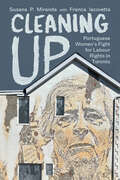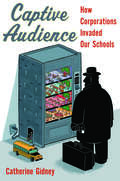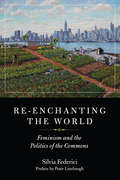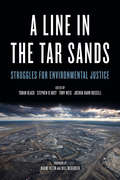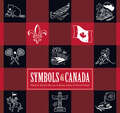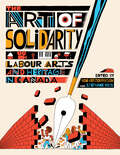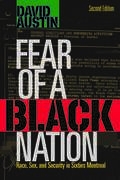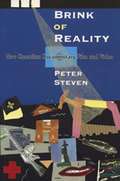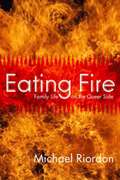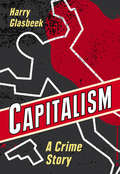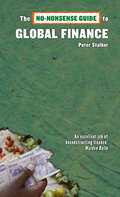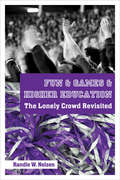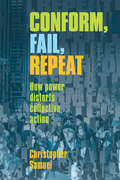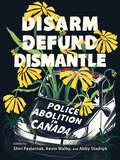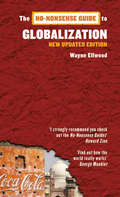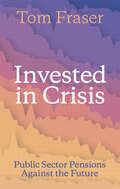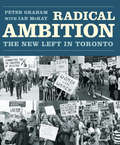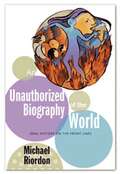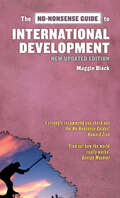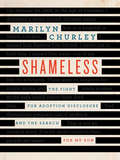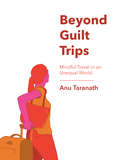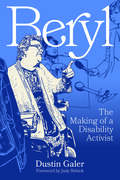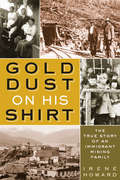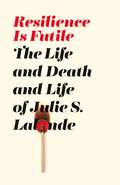- Table View
- List View
Cleaning Up: Portuguese Women's Fight for Labour Rights in Toronto
by Susana P. MirandaThis fascinating book uncovers the little-known, surprisingly radical history of the Portuguese immigrant women who worked as night-time office cleaners and daytime “cleaning ladies” in postwar Toronto. Drawing on union records, newspapers, and interviews, feminist labour historians Susana P. Miranda and Franca Iacovetta piece together the lives of immigrant women who bucked convention by reshaping domestic labour and by leading union drives, striking for workers’ rights, and taking on corporate capital in the heart of Toronto’s financial district. Despite being sidelined within the labour movement and subjected to harsh working conditions in the commercial cleaning industry, the women forged critical alliances with local activists to shape picket-line culture and make an indelible mark on their communities. Richly detailed and engagingly written, Cleaning Up is an archival treasure about an undersung piece of working-class history in urban North America.
Captive Audience: How Corporations Invaded Our Schools
by Catherine GidneyWhite Spot, a popular BC restaurant chain, solicits hamburger concepts from third and fourth grade students and one of the student’s ideas becomes a feature on the kids’ menu. Home Depot donates playground equipment to an elementary school, and the ribbon-cutting ceremony culminates in a community swathed in corporate swag, temporary tattoos, and a new “Home Depot song” written by a teacher and sung by the children. Kindergarten students return home with a school district-prescribed dental hygiene flyer featuring a maze leading to a tube of Crest toothpaste. Schools receive five cents for each flyer handed to a student. While commercialism has existed in our schools for over a century, the corporate invasion of our schools reached unprecedented heights in the 1990s and 2000s after two decades of federal funding cuts and an increasing tendency to apply business models to the education system. Constant cutbacks have left school trustees, administrators, teachers, and parents with difficult decisions about how to finance programs and support students. Meanwhile, studies on the impact of advertising and consumer culture on children make clear that the effects are harmful both to the individual child and the broader culture. Captive Audience explores this compelling history of branding the classroom in Canada.
Re-enchanting the World: Feminism and the Politics of the Commons
by Silvia FedericiDrawing on rich historical research, Silvia Federici maps the connections between the previous forms of enclosure that occurred with the birth of capitalism and the destruction of the commons and the “new enclosures” at the heart of the present phase of global capitalist accumulation. Considering the commons from a feminist perspective, this collection centers on women and reproductive work as crucial to both our economic survival and the construction of a world free from the hierarchies and divisions capital has planted in the body of the world proletariat. Federici is clear that the commons should not be understood as happy islands in a sea of exploitative relations but rather autonomous spaces from which to challenge the existing capitalist organization of life and labour.
A Line in the Tar Sands: Struggles for Environmental Justice
by Black, Toban; D'Arcy, Stephen; Weis, Tony; Kahn Russell, Joshua; Klein, Naomi; McKibben, BillTar sands “development” comes with an enormous environmental and human cost. But tar sands opponents—fighting a powerful international industry—are likened to terrorists; government environmental scientists are muzzled; and public hearings are concealed and rushed. Yet, despite the formidable political and economic power behind the tar sands, many opponents are actively building international networks of resistance, challenging pipeline plans while resisting threats to Indigenous sovereignty and democratic participation. Featuring contributions from Winona LaDuke, Bill McKibben, Naomi Klein, Clayton Thomas-Muller, Harsha Walia, Jeremy Brecher, Crystal Lameman, Melina Laboucan-Massimo, Yves Engler, Cherri Foytlin, Macdonald Stainsby, Yudith Nieto, Greg Albo, Brian Tokar, Jesse Cardinal, Rex Weyler, Jess Worth, and many more. The editors’ proceeds from this book will be donated to frontline grassroots environmental justice groups and campaigns.
Symbols of Canada
by Catherine Gidney Donald Wright Michael DawsonFrom Timbits to totem poles, Canada is boiled down to its syrupy core in symbolic forms that are reproduced not only on t-shirts, television ads, and tattoos but in classrooms, museums, and courtrooms too. They can be found in every home and in every public space. They come in many forms, from objects—like the red-uniformed Mountie, the maple leaf, and the beaver—to concepts—like free healthcare, peacekeeping, and saying “eh?”. But where did these symbols come from, what do they mean, and how have their meanings changed over time? Symbols of Canada gives us the real and surprising truth behind the most iconic Canadian symbols revealing their contentious and often contested histories. With over 100 images, this book thoroughly explores Canada’s true self while highlighting the unexpected twists and turns that have marked each symbol’s history.
The Art of Solidarity: Labour Arts and Heritage in Canada
by Stephanie Ross Rob KristoffersonThe Art of Solidarity delves into the rich tapestry of labour arts and heritage in Canada—from protest music and union banners, to murals, community theatre, and oral histories, to workers’ history museums and arts festivals—showcasing how these expressions of working people’s culture have been essential to challenging inequality and fostering solidarity. This inspiring collection highlights the resilience and creativity of labour arts and heritage practitioners who, despite financial and organizational challenges, continue to amplify the voices and experiences of working-class communities. In an economy characterized by growing polarization, inequality, precarity, and uncertainty about the future and meaning of work, labour arts and heritage has a central role to play in providing answers that challenge the prevailing narratives about whose work matters and whose efforts are central to our communities’ wellbeing. This work is more important than ever before.
Black Geographies and the Politics of Place
by Clyde Woods Katherine McKittrickBlack Geographies is an interdisciplinary collection of essays in black geographic theory. Fourteen authors address specific geographic sites and develop their geopolitical relevance with regards to race, uneven geographies, and resistance. Multi-faceted and erudite, Black Geographies brings into focus the politics of place that black subjects, communities, and philosophers inhabit. Highlights include essays on the African diaspora and its interaction with citizenship and nationalism, critical readings of the blues and hip-hop, and thorough deconstructions of Nova Scotian and British Columbian black topography. Drawing on historical, contemporary, and theoretical black geographies from the USA, the Caribbean, and Canada, these essays provide an exploration of past and present black spatial theories and experiences.
Fear of a Black Nation: Race, Sex, and Security in Sixties Montreal
by David AustinIn the 1960s, Montreal was a hotbed of radical politics that attracted Black and Caribbean figures such as C.L.R. James, Walter Rodney, Mariam Makeba, Stokely Carmichael, Rocky Jones, and Édouard Glissant. It was also a place where the ideas of Frantz Fanon, Aimé Césaire, and Malcolm X circulated alongside those of Karl Marx, Jean-Paul Sartre, and Simone de Beauvoir. During this period of global upheaval and heightened Canadian and Quebec nationalism, Montreal became a central site of Black and Caribbean radical politics. Situating Canada within the Black radical tradition and its Caribbean radical counterpart, Fear of a Black Nation paints a history of Montreal and the Black activists who lived in, sojourned in, or visited the city and agitated for change. Drawing on Saidiya Hartman’s conception of slavery’s afterlife and what David Austin describes as biosexuality – a deeply embedded fear of Black self-organization and interracial solidarity – Fear of a Black Nation argues that the policing and surveillance of Black lives today is tied to the racial, including sexual, codes and practices and the discipline and punishment associated with slavery. As meditation on Black radical politics and state security surveillance and repression, Fear of a Black Nation combines theoretical and philosophical inquiry with literary, oral, and archival sources to reflect on Black political organizing. In reflecting on Black self-organization and historic events such as the Congress of Black Writers and the Sir George Williams Affair, the book ultimately poses the question: what can past freedom struggles teach us about the struggle for freedom today? Featuring two new interviews with the author and a new preface, this expanded second edition enriches the political and theoretical conversation on Black organising and movement building in Canada and internationally. As the Black Lives Matter and abolition movements today popularize calls to disarm and defund the police and to abolish prisons, Fear of a Black Nation provides an invaluable reflection on the policing of Black activism and a compelling political analysis of social movements and freedom struggles that is more relevant now than ever.
Brink of Reality: New Canadian Documentary Film and Video
by Peter StevenIn Brink of Reality, Peter Steven examines the convergence of video-art and social-issue documentary, from the 1940s to the present. No other book has explored contemporary Canadian documentary so thoroughly, or provided as broad a view of the state of the art in the 1990s.
Eating Fire: Family Life on the Queer Side
by Michael RiordonEating Fire follows in the steps of Riordon’s popular 1996 book Out our way, on gay and lesbian life in the country (BTL, 1996). This new set of tales examines the range in living patterns and relationships among queer families across Canada. Eating Fire illuminates the rich diversity in which people negotiate their personal and public identities. As in all his writing and radio work, Riordon brings to this book a subtle, direct, and vivid style. For Eating Fire he travelled widely, engaging in significant new research and speaking with hundreds of fascinating people. The resulting book is wanted and needed in classrooms, within queer communities, and among everyone hungry for knowledge about the wide range of Canadian families.
Capitalism: How Law Shelters Shareholders And Coddles Capitalism
by Harry GlasbeekA mugger to a stranger, “Give me your wallet or I will beat you to pulp!” It is a crime. An employer says to a worker: “Adding lung-saving ventilation will reduce my profit. Give me back some of your wages and I will let you keep your lungs!” This is not a crime. Our assumptions about the world condition us to see these situations as legally different from one another. But what if we, the critics of corporate capitalism, instead insisted on taking the spirit of law, rather than its letter, seriously? It would then be possible to describe many of the daily practices of capitalists and their corporations as criminal in nature, even if not always criminal by the letter and formality of law. In Capitalism: A Crime Story, Harry Glasbeek makes the case that if the rules and doctrines of liberal law were applied as they should be according to law’s own pronouncements and methodology, corporate capitalism would be much harder to defend.
No-Nonsense Guide to Global Finance (No-Nonsense Guides #8)
by Peter Stalker"Meltdown," "crisis," "downturn," and the dreaded "R-word": recession. These words have migrated from business sections to headline news. From barter to coins, from the origins of banking to today's credit crunch, this highly topical book explores cash, borrowing, and lending, and delves into the dark side of the global financial system. But as we teeter on the brink of a global depression, space develops for new thinking. From doing away with tax havens, putting teeth into regulation, and taxing currency transactions, this book makes suggestions for a fresh start and argues that another (financial) world is possible.
Fun & Games & Higher Educatione’: The Lonely Crowd Revisited
by Randle W. NelsenFun & Games & Higher Education ranges from Wayne’s World to hot-rodding, from automobility to the popular phenomenon know as the tailgate party, from German sociologist George Simmel to Canadian Media Guru Marshall McLuhan–all in the interests in exploring North American obsession with play-and particularly the intersection between education, work, and leisure.
Conform, Fail, Repeat: How Power Distorts Collective Action
by Christopher SamuelAnti-globalization activists have done little to slow capitalism’s global march. Many of the gains made by decades of identity-based movements have been limited to privileged subgroups. The lesson of these movements is clear: struggle for change is essential, but the direction of change matters considerably. Like movements of the past, current social movements such as Black Lives Matter, Idle No More, and the growing anti-Trump movement, must navigate a path between reformism and radicalism, pragmatism and idealism, capture and independence. In Conform, Fail, Repeat, Christopher Samuel uses Pierre Bourdieu’s central “thinking tools” to show how power and domination force movements into a no-win choice between conformity and failure. With special attention to North American LGBTQ politics and the G20 protests in Toronto, Conform, Fail, Repeat shows how Bourdieu’s work can give movement observers as well as participants new tools for tracking and avoiding the pitfalls of conformity and failure.
Disarm, Defund, Dismantle: Police Abolition in Canada
by Kevin Walby Shiri Pasternak Abby StadnykCanadian laws are just, the police uphold the rule of law and treat everyone equally, and without the police, communities would descend into chaos and disorder. These entrenched myths, rooted in settler-colonial logic, work to obscure a hard truth: the police do not keep us safe. This edited collection brings together writing from a range of activists and scholars, whose words are rooted in experience and solidarity with those putting their lives on the line to fight for police abolition in Canada. Together, they imagine a different world—one in which police power is eroded and dissolved forever, one in which it is possible to respond to distress and harm with assistance and care.
No-Nonsense Guide to Globalization, 3rd Edition (No-Nonsense Guides #12)
by Wayne EllwoodFully updated, this new edition of a best-selling No-Nonsense Guide examines the debt trap; the acceleration of neoliberalism and the 'free trade' model; competition for energy resources; the links between the "war on terror," the arms trade, and privatization; and the emergence of China and India as economic superpowers. Ellwood provides a full analysis of the financial crisis that began in 2007, and explores what happens when deregulation, speculation, and greed are given complete rein. In addition to his cogent analysis, Ellwood offers strategies for redesigning the global economy to better serve the public good.
Invested in Crisis: Public Sector Pensions Against the Future
by Tom FraserAll workers deserve access to a safe and secure retirement. But neoliberal governments set up a dynamic where the retirement of some is predicated upon the exploitation of many. In the late-1980s, Ontario’s government, financial sector, and labour movement collaborated on a major restructuring of the province’s public sector pensions. The result? The unlocking of a vault containing billions of dollars, suddenly open to be privately invested in capital markets. All this occurred as Ontario’s manufacturing economy got smaller, its care economy got bigger, and its labour movement got weaker. In Invested in Crisis, Tom Fraser traces the rise of the province’s mega-pension-funds by melding history, geography, and political economy to situate this growth in the context of Ontario’s deindustrialization, the rise of finance, and the global politics of the built environment. Fraser delves deep into the sordid stories of the public sector pension fund investment world: the massive real estate projects, the infrastructure privatization debacles, how unions fight back, and what needs to be done so we can all save for a better future.
Radical Ambition: The New Left in Toronto
by Peter GrahamWriting for Maclean’s magazine in 1965, Peter Gzowski saw something different about the new generation of the left. They were not the agrarian radicals of old. They did not meet in union halls. Nor were they like the Beatniks that Gzowski had rubbed shoulders with in college. “The radicals of the New Left … differ from their predecessors not only in the degree of their protest but in its kind. They are a new breed.” Members of the New Left placed the ideals of self-determination and community at the core of their politics. As with all leftists, they sought to transcend capitalism. But in contrast to older formations, New Leftists emphasized solidarity with national liberation movements challenging imperialism around the world. They took up organizational forms that anticipated—in their direct, grassroots, community-based democracy—the liberated world of the future. Radical Ambition is the first book to explore the history of this dynamic movement and reveal the substantial social changes it won for the people of Toronto.
An Unauthorized Biography of the World: Oral History on the Front Lines
by Michael RiordonAn Unauthorized Biography of the World explores the practice of engaged oral history: the difficult, sometimes dangerous work of recovering fragments of human story that have gone missing from the official versions. Michael Riordon has thirty years’ experience as a writer and broadcaster in the field. Readers will encounter a gallery of brave, passionate people who gather silenced voices and lost life stories. The canvas is broad, the stakes are high: the battles for First Nations lands in Canada; environmental justice in Chicago; genocide in Peru; homeless people organizing in Cleveland; September 11/01, and after, in New York City; gay survivors of electroshock in Britain; the struggle to preserve a people’s identity in Newfoundland; peasant resistance to a huge transnational gold mine in Turkey.
No-Nonsense Guide to International Development, 2nd Edition (No-Nonsense Guides #17)
by Maggie Black“Overseas aid” and “international development” are catch-all terms that cover a multitude of activities - and abuses. Building dams in India, planting treesin Burkina Faso, and rescuing street children in Brazil are images of development with which we can all identify. But what few people realize is that the terms “aid” and “development” often mask confusion, contradiction, and even downright deceit. The updated version of 2002's best-selling No-Nonsense Guide to International Development explains what “development” actually is - and explores its political and economic roots in history. It shows what can happen in the name of development and argues for a more organic, social approach with those it seeks to serve as equal partners in the process.
Shameless: The Fight for Adoption Disclosure and the Search for My Son
by Marilyn ChurleyIn the late 1960s, at the age of eighteen and living far from home amidst the thriving counterculture of Ottawa, Marilyn Churley got pregnant. Like thousands of other women of the time she kept the event a secret. Faced with few options, she gave the baby up for adoption. Over twenty years later, as the Ontario NDP government’s minister responsible for all birth, death, and adoption records, including those of her own child, Churley found herself in a surprising and powerful position – fully engaged in the long and difficult battle to reform adoption disclosure laws and find her son. Both a personal and political story, Shameless is a powerful memoir about a mother’s struggle with loss, love, secrets, and lies – and an adoption system shrouded in shame.
Beyond Guilt Trips: Mindful Travel in an Unequal World
by Anu TaranathEvery year, hundreds of thousands of young people pack their bags to study or volunteer abroad. Well-intentioned and curious Westerners—brought up to believe that international travel broadens our horizons—travel to low-income countries to learn about people and cultures different from their own. But while travel abroad can provide much-needed perspective, it can also be deeply unsettling, confusing, and discomforting. Travelers can find themselves unsure about how to think or speak about the differences in race or culture they find, even though these differences might have fueled their desire to travel in the first place. Beyond Guilt Trips helps us to unpack our Western baggage, so that we are better able to understand our uncomfortable feelings about who we are, where we come from, and how much we have. Through engaging personal travel stories and thought-provoking questions about the ethics and politics of our travel, Beyond Guilt Trips shows readers ways to grapple with their discomfort and navigate differences through accountability and connection.
Beryl: The Making of a Disability Activist
by Dustin GalerBeryl Potter was a reserved working-class mother of three living a decent life, or so it seemed, when a harmless slip and fall marked the unravelling of everything that she had known about herself and the world around her. Over the course of six years, she endured unimaginable pain. As doctors raced to save her life, her limbs and eyesight were taken from her one by one. In the span of a few years, she lost nearly half her body, her financial security, her home, her husband, and any semblance of a recognizable future. A survivor of more than one hundred surgeries, a dangerous opioid addiction, and multiple suicide attempts, Beryl Potter devoted herself to bettering the lives of other people with disabilities and made a tremendous contribution to disability awareness from the 1970s to 1990s. In this unparalleled biography, Dustin Galer demonstrates how Beryl Potter seemed to crack the code of the social system that oppressed her. By wading into the weeds of her complicated life before and after her accident, Galer leaves readers with a complex portrait of a woman who defied and challenged gender and disability norms of her time, paving the way for disability justice.
Gold Dust On His Shirt: The True Story of an Immigrant Mining Family
by Irene HowardGold Dust on His Shirt is an evocative telling of the experience of a Scandinavian immigrant family of hard-rock miners at the turn of the century and up to World War II. Based on fascinating historical research, these are tales of arriving in ‘Amerika,’ blasting the Grand Trunk Pacific railway, work in the mines, and domestic life and labour struggles in company towns throughout British Columbia. Part family history, part economic and social history, Gold Dust on His Shirt is an intriguing look at life on the industrial frontier, the world of immigrant workers and the rise of unions such as the Wobblies. This remarkable and provocative tale of a family, region and era references a number of broader social and political issues. Born in Prince Rupert, British Columbia, to Scandinavian parents, Irene Howard has devoted her writing career to combining her interest in labour and immigrant history with her love of literature. She has been an English instructor and has broadcast talks for the CBC and written articles and essays for Canadian magazines and journals. She is the author of several books, including The Struggle for Social Justice in British Columbia: Helena Gutteridge, the Unknown Reformer, which in 1993 won the University of British Columbia Silver Medal for Canadian Biography and was shortlisted for a City of Vancouver Book Award and the Hubert Evans Non-Fiction Prize.
Resilience Is Futile: The Life and Death and Life of Julie S. Lalonde
by Julie S. LalondeFor over a decade, Julie Lalonde, an award-winning advocate for women’s rights, kept a secret. She crisscrossed the country, denouncing violence against women and giving hundreds of media interviews along the way. Her work made national headlines for challenging universities and taking on Canada’s top military brass. Appearing fearless on the surface, Julie met every interview and event with the same fear in her gut: was he there? Fleeing intimate partner violence at age 20, Julie was stalked by her ex-partner for over ten years, rarely mentioning it to friends, let alone addressing it publicly. The contrast between her public career as a brave champion for women with her own private life of violence and fear meant a shaky and exhausting balancing act. Resilience sounds like a positive thing, so why do we often use it against women? Tenacity and bravery might help us survive unimaginable horrors, but where are the spaces for anger and vulnerability? Resilience is Futile is a story of survival, courage and ultimately, hope. But it’s also a challenge to the ways we understand trauma and resilience. It’s the story of one survivor who won’t give up and refuses to shut up.
